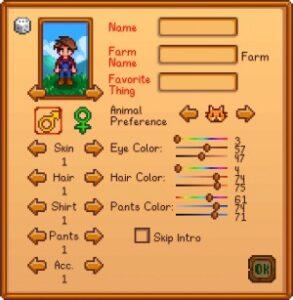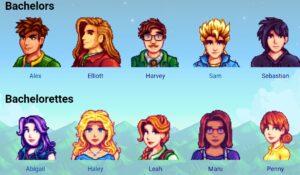This week I played a game near and dear to my heart: Stardew Valley. The game was released in 2016 by ConcernedApe (also known as Eric Barone) originally only on Windows, but it now exists on various platforms including MacOS, which is what I played it on. I’ve never been particularly into video games, but around a year ago my sister introduced me to Stardew, and I’ve been obsessed ever since. This assignment made me really consider the fact that, as a woman, I’ve always been a bit intimidated by video games and subconsciously classified most games as “for boys”, but I’ve never felt that way about this game despite it being created by a man. When playing Stardew Valley this week, I tried to really consider what about this game made it feel safe and welcoming for me, as a woman, to play.
 There are a few elements of the game that I believe make it feel really user-friendly regardless of a player’s gender identity. The first obvious fact is that you can select your character’s gender, and gameplay remains the same despite this fact — by this I mean that you can create a female character who will then inevitably become an expert miner and monster slayer, or you can create a male character who will be required to spend a large part of his day doing domestic chores around the home. This subverts gender roles and emphasizes the message that one’s gender identity isn’t what defines them. Players also have the ability to pay the Wizard to swap their gender at any point, and this decision has no impact on the character’s narrative or their relationships with other characters. A major critique I have, however, is that players are required to choose a gender for their character, with only “male” or “female” as options. Since gender doesn’t really seem to have any impact on the game, this decision feels unnecessary and restrictive.
There are a few elements of the game that I believe make it feel really user-friendly regardless of a player’s gender identity. The first obvious fact is that you can select your character’s gender, and gameplay remains the same despite this fact — by this I mean that you can create a female character who will then inevitably become an expert miner and monster slayer, or you can create a male character who will be required to spend a large part of his day doing domestic chores around the home. This subverts gender roles and emphasizes the message that one’s gender identity isn’t what defines them. Players also have the ability to pay the Wizard to swap their gender at any point, and this decision has no impact on the character’s narrative or their relationships with other characters. A major critique I have, however, is that players are required to choose a gender for their character, with only “male” or “female” as options. Since gender doesn’t really seem to have any impact on the game, this decision feels unnecessary and restrictive.
I think it’s also significant that none of the female characters are hyper-sexualized within the game, which is unfortunately pretty common in most video games. As Chess writes in her book, female bodies in video games are often unrealistic, such as “Lara Croft or Bayonetta” (57). In my opinion, all of the women are wearing clothing that’s suitable to their lifestyle and occupation, and narratively the women aren’t depicted as being any more sexual than any of the men. Furthermore, almost all of the characters are given background stories/story arcs revolving around complex and heavy themes, giving the impression that they are all multi-dimensional personalities regardless of gender. Chess specifically praises Stardew Valley in her book for its feminist narratives, writing, “[Stardew] denies the player any specific climaxes, existing in the never-ending narrative middle” (60).

[ graphic showing all the characters that players are able to date ]
Finally, romantic relationships can be a significant aspect of the game, and they aren’t limited to only heterosexual couples. The player can choose to date any of the other single characters in the game, regardless of their gender, and they can then proceed to marry them. Players can also choose not to pursue a romantic relationship, and there’s no real negative impact on their gameplay. Overall, Stardew Valley feels like a feminist game to me because it radiates acceptance and tolerance of all gender identities and sexual orientations — I believe all video game developers should look to Eric Barone as a role model in how to make a video game feel inclusive !



